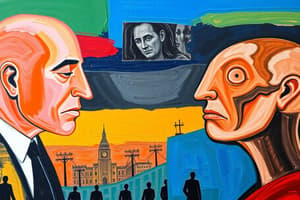Podcast
Questions and Answers
What was one of the main causes of the Great Depression?
What was one of the main causes of the Great Depression?
- The decline of the automobile industry in the US
- The rise of internet trading platforms
- The US stock market crash of 1929 (correct)
- Increased agricultural production in Europe
What was the approximate unemployment rate in the US during the Great Depression?
What was the approximate unemployment rate in the US during the Great Depression?
- 10-15%
- 5-10%
- 20-30% (correct)
- 35-40%
Which initiative was part of President Franklin D. Roosevelt's New Deal?
Which initiative was part of President Franklin D. Roosevelt's New Deal?
- The National Debt Relief Act
- The Public Works Administration (correct)
- The Bank Reform Program
- The Federal Employment Agency
What major event is often cited as a factor in ending the Great Depression?
What major event is often cited as a factor in ending the Great Depression?
Which of the following was a consequence of the Great Depression in Germany?
Which of the following was a consequence of the Great Depression in Germany?
What was the purpose of the Agricultural Adjustment Act (AAA)?
What was the purpose of the Agricultural Adjustment Act (AAA)?
What Supreme Court ruling affected the National Industrial Recovery Act (NIRA)?
What Supreme Court ruling affected the National Industrial Recovery Act (NIRA)?
What was a common way for people to survive during the Great Depression?
What was a common way for people to survive during the Great Depression?
Flashcards
Great Depression Cause
Great Depression Cause
A complex event with various factors including European instability, stock market crash, over-reliance on credit, and industry boom followed by hardship.
Stock Market Crash of 1929
Stock Market Crash of 1929
A significant event widely considered the starting point of the Great Depression in the US
New Deal
New Deal
A series of programs aimed at economic relief, reform, and recovery during the Great Depression, including public works, agricultural aid, and labor reforms.
Hoovervilles
Hoovervilles
Signup and view all the flashcards
Unemployment during Depression
Unemployment during Depression
Signup and view all the flashcards
Nazi Party Rise
Nazi Party Rise
Signup and view all the flashcards
New Deal Programs
New Deal Programs
Signup and view all the flashcards
World War II's impact
World War II's impact
Signup and view all the flashcards
Study Notes
The Great Depression was one of the most devastating economic downturns in history, lasting from the late 1920s into the early 1940s. This era saw significant declines in industrial output and massive unemployment rates, affecting millions of individuals and families across the globe.
- The Great Depression was a catastrophic global event causing widespread poverty.
- Causes included European economic instability (particularly Germany's war debt and hyperinflation), the 1929 US Stock Market Crash, and excessive US credit leading to debt in the 1920s.
- The booming US economy of the 1920s relied on consumerism and industries like auto manufacturing.
- US agriculture suffered from overproduction and declining demand.
- The 1929 stock market crash had global repercussions, worsening existing economic hardship.
The Impact of the Great Depression
- US unemployment reached 20-30% of the workforce.
- People relied on breadlines and Hoovervilles (shantytowns named after President Hoover).
- Germany's crisis led to the rise of the Nazi Party and Hitler's chancellorship.
- Thousands of US banks collapsed, worsening the economic crisis.
The New Deal
- Franklin D. Roosevelt's New Deal aimed at economic relief, reform, and recovery.
- New Deal programs included:
- Public Works Administration (creating jobs through infrastructure).
- Agricultural Adjustment Act (helping farmers).
- National Industrial Recovery Act (declared unconstitutional).
- Wagner Act (improving worker rights, including unionization).
- Social Security Act (providing unemployment insurance, and aid to the poor, elderly, and disabled).
- Historians debate the New Deal's effectiveness.
The End Of The Great Depression
- World War II significantly stimulated the US economy, helping end the Depression.
- Keynesian economics, advocating for government intervention to boost the economy, played a role.
- Some Roosevelt-era policies, like the Glass-Steagall Act, are credited with preventing future crises while its repeal in 1999 is linked by some to the 2008 financial crisis.
- The Great Depression highlights global economic vulnerability and the need for strong economic policies.
Studying That Suits You
Use AI to generate personalized quizzes and flashcards to suit your learning preferences.




